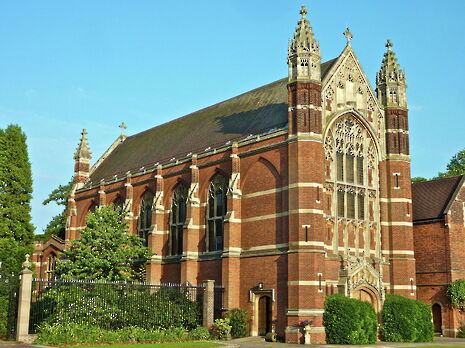Yes I’m a Christian, but not one of those
Why the dominance of CICCU and its conservative stance on Christianity may be problematic

Many of our university’s colleges are dominated by college chapels, places of Christian worship that hope to provide an inclusive space for people to worship and find peace. The majority of colleges have a Christian (usually Anglican) priest as their chaplain, who is a key part of college pastoral support. Yet, despite this very visible presence, it is the Cambridge Inter-Collegiate Christian Union (CICCU) who dominate the university at large. With its bright hoodies, free doughnuts and ‘Text-a-Toastie’ service, the CICCU has a pervasive presence that is hard to escape.
Since arriving in Cambridge, and as a Christian following the road to priesthood in the Anglo-Catholic community, I feel I have to begin every conversation about my faith with the disclaimer: "Yes, I’m Christian, but I’m not one of those." The problem, as I understand it, is that in claiming to be the Christian Union, CICCU have managed to disregard any other Christian voice – not least those of the hundreds of students who worship in college chapels – as not Christian, simply because they don’t ascribe to CICCU’s Conservative Evangelical doctrine.
I fundamentally disagree with many of the defining points of the Christian Union’s doctrinal statement: for example, that they believe in the divine inspiration and infallibility of Holy Scripture and its supreme authority in all matters of faith and conduct, and that they subscribe to the statement that "man [is] subject to God’s wrath and condemnation". However, my profound disagreement is no reason for me, or those like me, to be dismissed as less than Christian. These articles of faith sadly translate to heated (and often public) opposition to homosexuality, a distinct underlying misogyny in many of their events and talks, and a belief that if you’re not with them, you’re against God and you’re hellward bound.
Of course, not every member of the Christian Union holds these views, but the ethos of the Union tilts strongly in this direction; they tend to dismiss opposition as coming from silly ‘liberal Christians’ who have just confirmed their faith in order to prevent arguments and make themselves attractive, something which Christ specifically guarded against. This is profoundly wrong. The hundreds of students, staff and fellows in Cambridge who confess Christ as Lord are not half-Christians, they are people who embrace a vision of the world in which love has triumphed over hate, life conquered death, and all people are loved and embraced by a God who transcends all to understanding, but who has shown his tender love in the life of Jesus Christ.
The world-changing vision that I and countless others embrace does not leave space to understand Christian faith as a conservative force against novelty or moral development; I believe Christian doctrine to be constantly renewed and vivified by Christians' commitment to live Christ-like lives of love and service to the world. Yes, Saint Paul didn’t agree with (male) homosexuality, but that’s because he understood it as nothing more than pederasty. In recent decades, our understanding of relationships have been recast and our conception of human sexuality and gender has been transformed; the Church’s doctrine should be rewritten to take in all we now know, in response to the pain the Church’s current stance has caused to many.
My main concern is that CICCU, the society which claims to represent all the Christians in Cambridge, actually only reflects one strand within contemporary Christian thought. The vision of the liberal Catholic wing is that the Church of God should be as diverse as the world it seeks to serve, a place where all are equal: where the disabled, the marginalised and the broken are bound together by a common vocation – to love without condition, to become servants of the world and to bring dignity and life to our world which is so often full of hate and pain. Of course we often fail at this, but it remains the defining principle of my life and the lives of many other Christians in Cambridge.
Jesus was crucified for challenging the rigid morality, the self-righteousness and the religious norm of his day. Perhaps it is time Cambridge followed the example of Exeter and forced CICCU to be named as what it is, the 'Evangelical' Christian Union, allowing space for the many other Christians in Cambridge to flourish without feeling their integrity as disciples of Christ is under attack.
Ultimately, the God whom we worship longs for all people to have ‘life in all its abundance’, embraces and accepts us as we are, and calls us to draw close to him in love and service. My hope (and my prayer) is that the Christian Union, and all others of faith, may lay aside their obsession with sex and morality and embrace the far more radical Gospel of love, which calls us to raise up the poor, feed the hungry and comfort the distressed - then, and only then, can any one group claim to be the Christian Union.
 News / Report suggests Cambridge the hardest place to get a first in the country23 January 2026
News / Report suggests Cambridge the hardest place to get a first in the country23 January 2026 News / Reform candidate retracts claim of being Cambridge alum 26 January 2026
News / Reform candidate retracts claim of being Cambridge alum 26 January 2026 News / Cambridge ranks in the top ten for every subject area in 202623 January 2026
News / Cambridge ranks in the top ten for every subject area in 202623 January 2026 Comment / Cambridge has already become complacent on class23 January 2026
Comment / Cambridge has already become complacent on class23 January 2026 News / Palestine activists project slogans onto John’s24 January 2026
News / Palestine activists project slogans onto John’s24 January 2026








